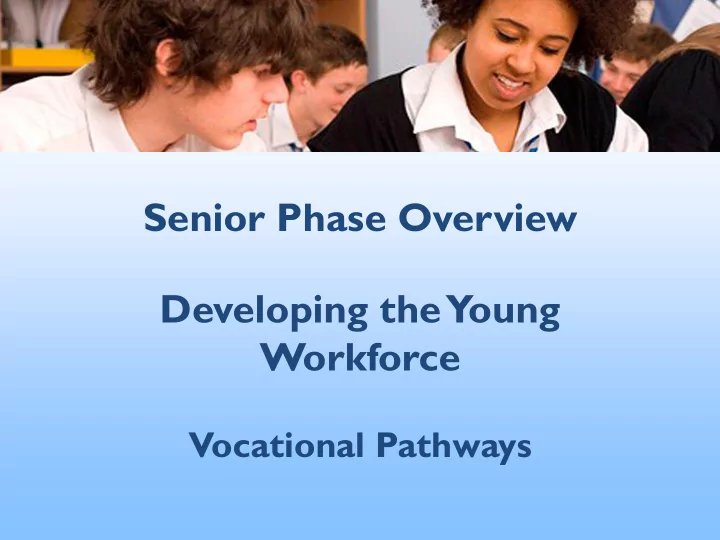

Senior Phase Overview Developing the Young Workforce Vocational Pathways
Context Commission for Widening Access Report : A Blueprint for Fairness Curriculum for Excellence
Developing the Young Workforce: Scotland’s Youth Employment Strategy, December 2014 • Supports CfE, ensuring all young people access the broadest range of opportunities by: • Placing a sharper focus on skills for work and employability • Improving the quality of learning about the world of work and knowledge about the wide range of career options • Improving the quality of work based learning • Having schools, colleges and industry working together systematically to provide coherent learning experiences • Extending the breadth and reach of apprenticeship opportunities • Developing a clear understanding of the value of vocational education for all of our young people
DYW : Equalities • Equality and encouraging diversity in the workplace is central to the DYW Strategy • Key equality characteristics : addressing gender stereotypes (particularly STEM), black and minority ethnic communities, young disabled people, care leavers • Raising awareness and building capacity and understanding by education and employers on supporting and encouraging diversity in the workforce • Monitoring of progress
Employer Engagement Improving links between education and work • National DYW Group • DYW Regional Groups • 14 groups to date Glasgow, North East, Fife, West, Ayrshire, North Highland, ‘Edinburgh, Midlothian and East Lothian’, Dumfries & Galloway, Moray, ‘Dundee and Angus’, West Lothian, ‘Inverness and Central Highland’, West Highland, and Forth Valley. • School/ Employer Partnerships for every secondary school by 2018/19
6
Senior Phase Vocational Pathways: Where do we want to be? • All young people have chance to participate in flexible senior phase pathways, which include good quality vocational provision • An increase in the uptake of vocational qualifications available to those in the senior phase (2015+) • An increase in the quality and number of strategic partnerships between local authorities, schools and colleges to widen the offer to young people in the senior phase (2015-16) • All secondary schools will have active partnerships with regional colleges (2018-19)
Where are we now? • KPI3 baseline (13/14): 7% school leavers had one or more vocational qualifications at SCQF 5 or above • SFC data shows that there were 2,384 enrolments compared to 2,169 in 2013-14, an increase of 9%. • In 2015 in addition to National Courses, 52,544 qualifications specifically recognising skills for life and work were awarded – a rise of 10 % compared to 2014. These qualifications include Skills for Work and Personal Development Courses, SQA Awards, National Certificates, and National Progression Awards, and sit alongside the wider range of National Courses which also help young people to develop valuable skills for life and work. • A wide range of other youth work awards and bespoke qualifications and learning pathways also being developed in local areas to address their own economic needs. • Foundation apprenticeships are being delivered in 20 local authorities in at least 1 of 6 industry sectors. Around 330 pupils are currently working towards a FA. Ambition is that FAs will be available to more pupils, in more subjects, in more regions in 16/17 and offered in every school from 20/21.
Challenges • Building capacity • Scalability - planning provision to meet demand • Equality of access to provision • Access to high quality partnerships with employers
Understanding and maximising capacity • Learning from 14-15 early adopter projects – http://www.sfc.ac.uk/communications/Guidance/2015/SFCG D182015.aspx • Outcome Agreement process • Work to promote local strategic leadership – Strategic discussions with Directors of Education & College Principals – Learning Events bringing all partners together to reflect on current position and forward plan • Targeted engagement with school and college sector
Improving planning and promotion of provision • Tools developed to support reflection on senior phase provision and the development of partnerships • Expectations of practitioners set out in Career Education Standard 3-18 • More cross-sector CPD activities
Next steps • Continued engagement with partners and practitioners at all levels • Sharing the learning from pathfinders/ early adopters/ successful partnerships • Clear national expectations set out in outcome agreement guidance and inspection advice
How good are our partnerships (schools, colleges, HE institutions and employers) in planning learning for young people? Mark your level of confidence along the lines - 10 for challenges fully met, 1 for challenges farthest away from meeting. 1. How well do we collaborate with a 10. How well do we involve young diverse range of partners to meet the people in designing their learning? needs of all young people? 2. How formalised are these 9. How current and extensive is partnerships in working toward our use of data in designing our a shared vision? curriculum? (e.g. Labour Market Information) 8. How do our plans 3. How well do we address equalities issues? enable practitioners (e.g. gender, BME, across sectors to learn disabilities & learners in together? care) 7. How well do we work with 4. How aware are we of the employers to shape our curriculum various pathways on offer to planning? young people in the senior phase? 6. How well do we recognise the opportunities available from the wide range of youth awards and 5. How innovative are we in designing our offer qualifications? (e.g. Duke of Edinburgh, City & Guilds, for young people? Edexcel, BTEC, ASDAN, John Muir) http://www.educationscotland.gov.uk/learningandteaching/thecurriculum/dyw/index.asp
Keep in T ouch @ scotgovfairer #youngworkforce http://blogs.scotland.gov.uk/developing -the-young-workforce / youngworkforce@scotland.gsi.gov.uk 14
Senior Phase Policy Unit, Learning Directorate, Scottish Government • Katherine.McNab@gov.scot • Julie.Anderson@gov.scot 15
Recommend
More recommend